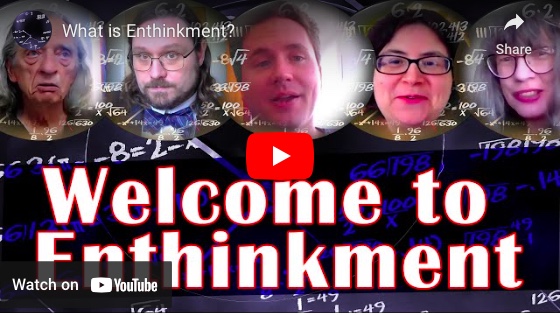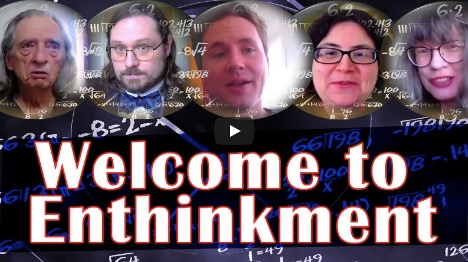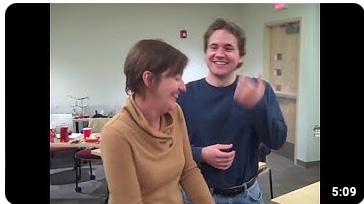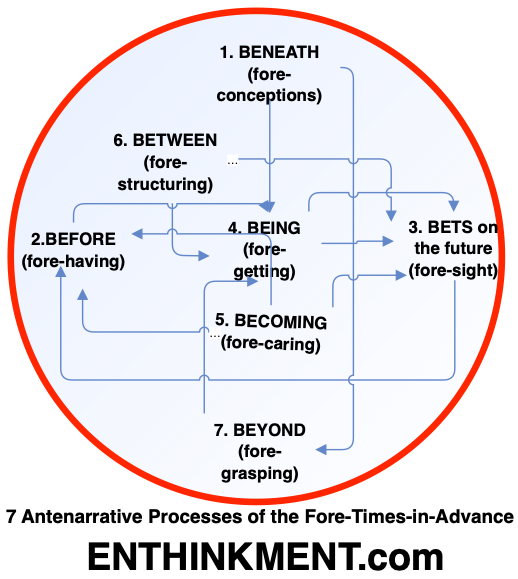Videos Page
Most recent Videos:
h⏳🔜 🔮🔚What is Marquis DeSade's and Gilles Deleuze's approach to Time? There is NO NOW!https://youtu.be/oEoGQ34vYuU
🌎💰💰💰👍True Storytelling Solution to Greed #Shorts ✅
| 24-SECONDS
Click on Image to Learn How to ENTHINK not just spin your life on the Hamster Wheel of ENACTMENT |
One good way to answer this is with our SHORT YouTubes, each less than 1 Minute. Some are quite Humorous
You can View the entire Enthinkment.com Playlist
https://www.youtube.com/playlist?list=PL0RIj97ddbOE-ct8lssOpBaYO8CzjWED6
Click Here for 33 Second SHORT on Louis Ralph Pondy ENTHINKMENT Circle
by David Michael Boje Ph.D.
davidboje@gmail.com
ENTHINKMENT SHORTS
24 Second Short to Intro what is Enthinkment
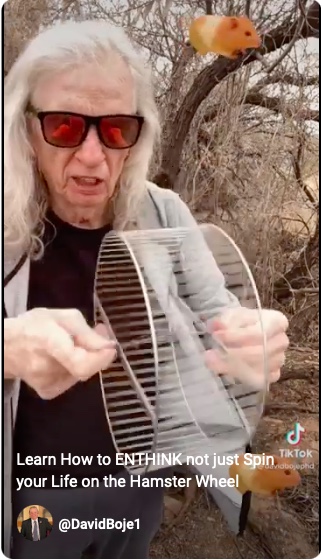
Learn How to ENTHINK not just spin your life on the Hamster Wheel
A 22 second short
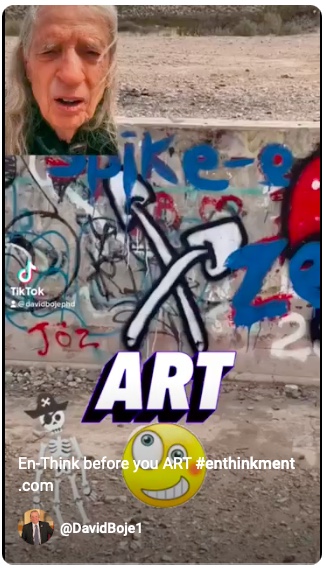
Click Here for En-THINK before you ART
A 17 Second Short
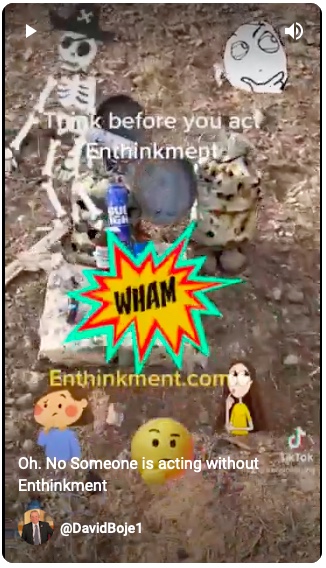
Click here for Oh No! Someone is EN-Acting without EN-Thinking
A 18 Second Short
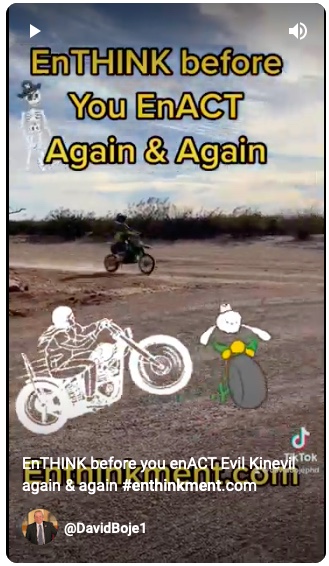
Click Here for ENTHINK before You Enact Again & Again a Routine
A 34 second Short
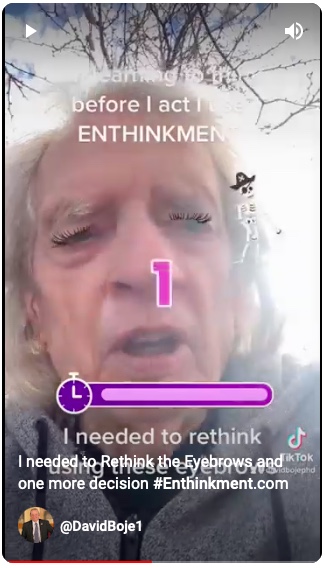
Click Here for I need to Learn to make En-think-ment decisions, Look at my Eyebrows
A short 45 Second Introduction - no jokes
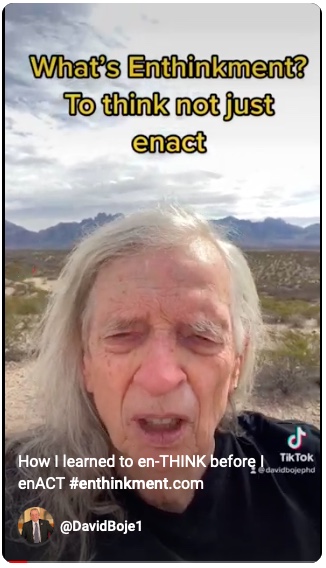
Click Here for How I learned to en-THINK before I enACT
1 Minute
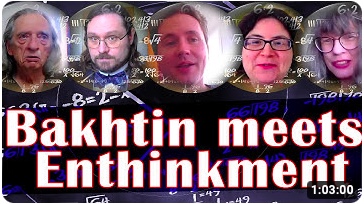
Click here for Bakhtin meets Enthinkment YouTube
LONGER YouTube VIDEOS 1 to 18 Minutes:
15 Minutes
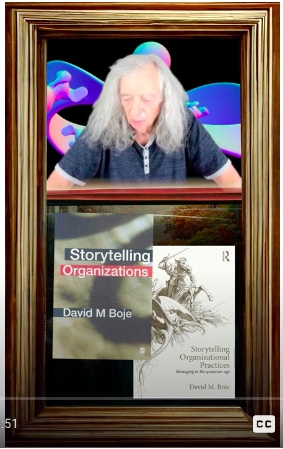
Click Here Boje's 5 comparisons of Bakhtin & Heidegger on their EN-THINKing Processes
13 Minutes
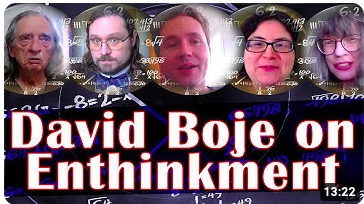
Click here for Boje on Enthinkment YouTube
18 Minutes
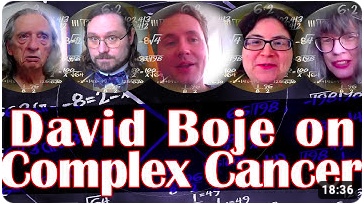
Click here for Boje on Complex Cancer & Enthinkment YouTube
P.S. Boje is not Stage 4, cancer survivor and doing well.
You can View the entire Enthinkment.com Playlist
https://www.youtube.com/playlist?list=PL0RIj97ddbOE-ct8lssOpBaYO8CzjWED6
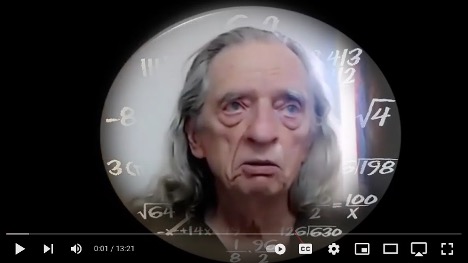
See YouTube video on the Important Contribution of Professor Louis Ralph Pondy, & antenarrative explained
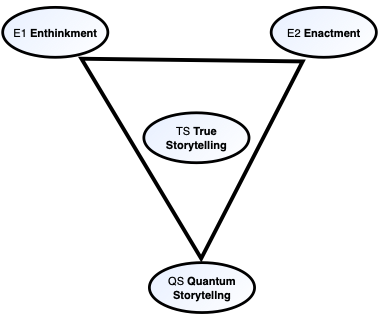
Figure from Boje's new book On Louis Ralph Pondy's Two Gifts to Management Thought (download free until published by Routledge)
Q: What is our model of how the relationships can be explored.
E1 in Pondy’s project become both ‘mind-thinking consciousness’ and intuition.
E1 What is Called Thinking? (Heidegger's book) Thinking is a process of inquiry, a way of living, an encompassing life approach of a great thinker. Enthinkment is taking-to-heart, and the histories, futures, the situations of Being-in-the-world of people, things, and Nature, and it is learning how to think, to discover, disclose, reveal, and uncover our inseparability from Being.
For Heidegger (1954, from lectures given 1951 & 1952, in Book, What is called Thinking?, hereafter WcT)) thinking is not opinion, not wholly dependent on one's will or wish. Be learning to think, we realize we are not yet capable of thinking. "We learn to think by giving our mind to what there is to think about" (WcT, 4). In writing a dissertation, we start with what is thought-provoking, yet we are still not thinking. In writing a dissertation, ideally we stay with a question, open ourselves to a problem, stay with it for for years, without relegating what's thought-provoking to mere indifference, and soon boring (WcT 5). Citing many great thinkers is no guarantee the dissertation writer is actually thinking. You can write a dissertation, and still not be thinking:
"Most thought-provoking is our thought-provoking time is that we are still not thinking" (WcT 6).
E2 enactment sensemaking does two fold differently, setting out subjective consciousness as separated from the object, and placing this duality in a linear retrospective narrative plotted with a beginning, middle, and end (Weick, 1995). What does Weick (1995: 36) say: Pondy’s “enthinkment” as something “about conceptual pictures of the world” whereas enactment is “foremost about action in the world” that Weick says is “also a subjective, punctuated and bracket world” (p. 37).
“The concept of an enacted
environment is not synonymous with the
concept of a perceived environment,
even though citations of the concept would
suggest that it is. If a perceived
environment were the essence of enactment
then, as Lou Pondy suggested, the phenomenon
would have been called enthinkment not
enactment.”
QS (QUANTUM STORYTELLING) We have an annual QS conference each December (details at https://davidboje.com/quantum). An understanding of QS (quantum storytelling) is a way to get deeper into the E1<-->E2 relationship, and sort out what's TS true storytelling (Larsen, Boje, & Bruun, 2021). There are several contrary quantum theories. We have mentioned Baradian neither/nor, which is anti-dialectical, and does not address Spirit. We refer you to Saloj Žižek's Hegelian philosophy and Lacanian psychoanalysis (Less than Nothing: Hegel and the Shadow of Dialectical Materialism). It has about 100 pages deconstructing why Spirit and dialectic of materiality with discourse are an alternative theory, one we call Quantum Storytelling (QS). In short, there are several viable quantum theories, what we call QS to shine different light on E1 and E2, and an annual conference, and a new journal all about it. As QS re-imagines what is E1 and E2 together, assumptions change.
TS (True STORYTELLING) is all three relationships (E1, E2, and QS), and that triadic relationality gives dynamic answers to ‘what’s true?’ (Larsen, Boje, & Bruun, 2021) In sum, getting better practices of E1, E2, and QS helps get to some potential TS in a self-correcting process we call together-listening with together-telling (Boje & Rosile, 2020).
TRUE STORYTELLING SYSTEM Weekly Zoom Meeting to get Certified as Organizational Storytelling Consultant, Trainer, or Coach. Network event 9AM-10:30AM MOUNTAIN TIME ZONE Thursdays & its Free to anyone. Please get the word out (its for training trainers, consultants, & coaches in organizational storytelling) in ethical practices to sustainable organizational development, and change.
USE ZOOM Link https://us06web.zoom.us/j/8950795007?pwd=b1BnMVVXT3V6UDRZUVFmMkU2NzQydz09
More at https://truestoryteling.org
The Enthinkment Circle carries on his work by studying all of Pondy's writing in order to develop a proper understanding of E1 enthinkment, in relation to E2 enactment sensemaking. Pondy’s three writing is in three stages.
Stage 1 1966-1976 - he uttered the word 'enthinkment' and according to Weick (1969/1979; 1995), Gioia (2006), and Hatch (2011) contend he was not serious about it when he spoke it.
Stage 2 1976-1980 his writing speaks for itself, challenging Management Thought to think differently.
Stage 3 1980-1986 his writing speaks of the unity of thinking and intuition, and in 1986 presentation,
Professor Louis Ralph Pondy (1986) confesses that organizations are 'conflict systems' of persistent anarchy, and mistakenly framed as harmonizing or cooperative systems.This means we are contesting the 'enactment, not enthinkment' presumption of dozens of colleagues. We pursue either/or, both/and and in QS, the neither/nor. In the theme 'enactment, not enthinkment' the either/or is too quickly resolved. But the irony is how often 'either/or' dismisses E1, but uses cognitive, perceptions, scripts, and so on in E2. With the 'both/and' that could work if there was proper theorizing of E1<---->E2 actually interrelate with the two have in difference, and in common ground. That brings us to 'neither/nor'. Hahn and Knight (2021: 381) "Organizational phenomena thus neither preexist nor fully depend on textual or discursive construction." This is an Baradian quantum approach to the relationship of materiality and discourse known as 'agential realism' which has no dialectic, and is resolved by Hahn and Knight (2021) in favor of E2 having three stages of sensemaking (scanning, interpreting, & responding. There are however other quantum theories, and here we pursue them all.
What other support for E1, whatever the E2 circle theorizes as Pondy's intention when he once spoke the word sometime before 1979. Consider John Dewey (1910: 3, How We Think): "Even when thinking is used in a broad sense, it is usually restricted to matters not directly perceived: to what we do not see,smell, hear, or touch." To think E1 is to reflect, sometimes loosely without grounds for what's called 'reflective thought.' "In its loosest sense, thinking signifies everything that, as we say, is 'in our heads' or that 'goes through our minds'... daydreaming, building of castles in the air, that loose flux of casual and disconnected material that floats through our minds in relaxed moments" (IBID. p. 2). We are always thinking of something or other, which is what storytelling relation to E1 is all about, a way of reflective thought, about matters not directly perceived by E2.
In sum, E1 enthinkment is twofold ensemble processes, the fold of one system and the subsistence in spaces and times of many diverse systems with their own storyable or narrativizable accounts. E1 enthinkment differentiates consciousness of Oneness and the play of differences, folding them together in the diversity of Manyness. Enthinkment is part of the triadic of E1 Enthinkment E2 Enactment and QS Quantum Storytelling. Louis Ralph Pondy, a great thinker, wo spoke the word 'enthinkment, but once, and never once wrote about it, yet did Enthinkment during his short life. Most en-actors, says the motto, 'enactment, not enthinkment.' We, however, wonder, how people think, and how ensembles do together-thinking and together-listening. We wonder if people are doing too much enacting without thinking. What is Management Thought, not thinking? Would their be inventions such as automobiles, cell phones, and so on, without leaping into paths of thinking? To take a conjunction approach, both E1 and E2 are mutually implicated. QS embraces them both.
Enthinkment and an example: Some BOOKS for your LIbrary
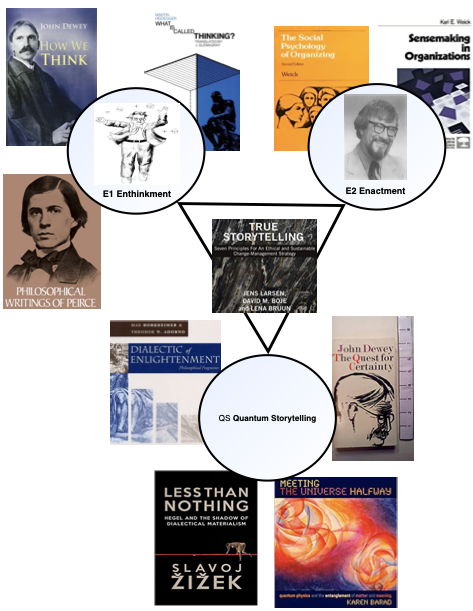
Enthinkment And
Charles Sanders Peirce
Triad
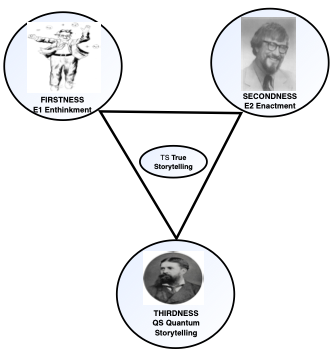
Antenarrative Processes Boje (2001) began working with just two antenarrative processes, (#2) the Before of retrospective sensemaking, and (#3) the Bets on the Future of prospective sensemaking. Since Henri Bergson (born Oct 18, 1859; died Jan 4, 1941), the traditional thinking was there is only retrospection is feasible, and prospection is an illusion, an impossible quest. Now a days, retrospection-prospection are common sense notions of thinking about time in Management Thought. For thirty plus studies of antenarrative processes, definitions of seven processes, and lots of diagrams, see antenarrative.com.
In true storytelling, (Larsen, Boje, & Bruun, 2021), we use the four hearts and the Nautilus-Spiral in our training seminars (truestorytelling.org). The Enthinkment Circle (Boje, Pelly, Saylors R, Saylors J, &Trafimow, 2022) uses the Nautilus-Sprial to depict thinking about that which withdraws from the thinker. We assert it is possible to learn how to think.
Of course, Heidegger knows science
academies are thinking, but the question Pondy and
Heidegger both asked, ‘what are we not thinking
about?’
Pondy taught Boje to think, to do enthinkment, though never spoke the word to him. He did this by marvelous challenges to all his Ph.D. students: What is the sound of the other hand clapping; leadership as a language game, beyond open systems, and one few know about a piece David Boje did with Dan Brass, and Lou Pondy, called 'dancing partners' (what if we dance two ways of thinking together? in 1978 and again 1979, in Managing I and Managing II books, Boje, Brass, and Pondy).
Enthinkment is not so much an act of thinking, it is more a way of living life. Enthinkment is a long-practice, like that of the master-apprentice learning to blacksmith or be a printer in the medieval guilds. My master teacher, Louis Ralph Pondy uttered the word but once. He and Karl Weick were strolling on a road among the cornfields of Urbana-Champaign, Illinois. Pondy, as Weick reports it in two books (Social Psychology of Organizing; Sensemaking), Pondy recanted, his original phasing “that would be Enthinkment” and upheld Weick’s interpretation, its ‘not Enactment.’ Every student of Weick, except me, evermore used the phasing “Enactment, not Enthinkment.”
We have more allegiance to my old mentor Pondy, and decided to re-read every article, chapter, and speaking notes available from before his dissertation, through his professor career, to the last talk he gave at the Academy of Management, before passing away so quickly of bone cancer, at age 49, so young, in 1987.
The Enthinkment Circle has been meeting a couple of years, on Zoom, every Tuesday (1PM Mountain time, New Mexico). I am at yet another turning point. My thinking on Enthinkment, a word uttered once my one mentor, written twice by another mentor. The path of thinking of the 1960s when Pondy did his dissertation, and had his breakthrough article in Administrative Quarterly, a year later — has turned other paths of thinking. The path of thinking of the 70’s to the 2000’s has replace the thinking of the 60’s. That is for sure.
During the last decade or so, my path of thinking has been Heidegger’s What is Called Thinking, his lectures from 1951 and 1952, at University of Freiburg, while forbidden to write, translated by J. Green Gray into English in 1968. This gives the story network method form my 2001 book (Narrative Methods for Organizational & Communication Research) a new twist. What if, these networks, are paths of thinking.
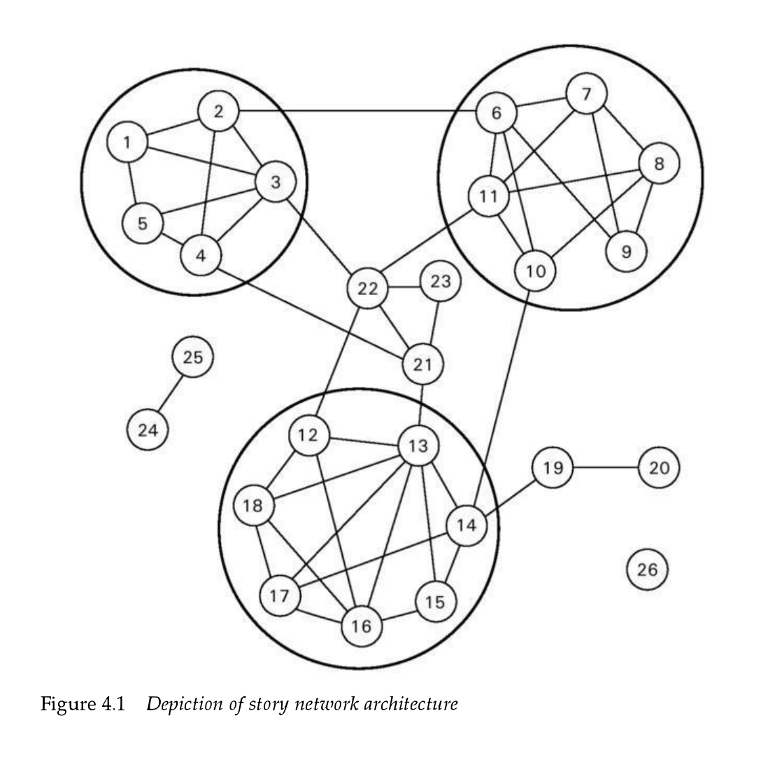
A story network architecture (Boje 2001) is about of paths of thinking, encountering one another. Organizations are into their own way of thinking. That’s not Enactment! A shocking and provocative statement by Heidegger to his students, writing it down "Science does not think” (What’s Called Thinking book). What are the organizations not thinking about? Heidegger is concerned we live in this technological age (for him the 1950s), and even back then organizations concern themselves with being dominant over water and Earth. I state it this way because I am writing and videoing about Global Water Capitalism in the technological age of the 2020’s. It is a thinking by dominion over water and Earth. by networks of business and investment organizations and thinking about protecting water and Earth by NGOs. Both ensembles of organizations are telling it differently, and thinking differently. These ways of thinking about water ‘Techne', water technologies, are so different from indigenous ways of thinking about water aliveness.
I am left to write about Enthinkment, and to participate with colleagues each week in the Enthinkment Circle.
Enthinkment is not the path of producing knowledge
Enthinkment is not the path of practical wisdom
Enthinkment is not resolving the cosmic riddles
Enthinkment is not directly to do with the power to act
All these ways of thinking are clearly inferior to Unthinking, the questioning of what passes for thinking in Management Academies, and in my studies of thinking paths in Global Water Capitalism, in water science of hydrology, in thinking of investors buy water stocks (quite a good investment I am told, and Yahoo Finance 5 year trend charts, my video released to YouTube yesterday, does confirm).
Why are Bottled Water & Tap Water NOT best in the World?
Video link
Final Episode 7 of GLOBAL WATER CAPITALISM
Video in 5 solutions paths for Water Capitalism, skip to part you like best, then watch them all
Path 1- Stock Market Investment in Water Corporations
Path 2 – Grant Legal Person Status to Rivers
Path 3 – Various Spiritual Ecologies, including Professor Gregory Cajete
s see See YouTube Tribal Wisdom and Storytelling: Drs. David Boje and Gregory Cajete -- https://www.youtube.com/watch?v=VcsPh-5QbdE
Path 4 – Hydrologists who have Reverence Ethics for Ecology (included in this part, are several water experiments you can do at home)
Part 5 – Water Aliveness (combines paths 2, 3, 4)
This is about that diagram of the architecture of story networks include above and its about Enthinkment.
The
most recent publication: Boje, D. M.; Pelly,
D. M.; Saylors, R.; Saylors, J.; Trafimow,
S. (2022). Implications of Tamara-Land
Consciousnesses. Discourses for Organization
Culture Studies. No. 16 ISSN 2450-0402. http://dyskursy.san.edu.pl/abs/dyskursy16-4.pdf The four 'taking-to-hearts' and the 'letting-what-lies-Before' and 'letting-what-lies-in-antes-Bets on the Future. Not the arrow of time in commonsense of past, present, future, but two directions of time-Becoming (retrospective & prospective). In poker, we say, 'ante-up' and place our money in the pot. The next person can raise the ante or check. If you are next, you may raise the ante, check, or fold. Pots get bigger and bigger this way. There is investment in the antes, and anticipation, apprehension about whose Bets on the Future will be fulfilled. Bets and antes are about intentions getting fulfilled Becoming-in-Being, a Being that conceals, and withdraws into concealment until the cards are on the table, and the result is revealed. Thus, our choice of Nautilus-Spiral in thinking about Being:
Enthinkment can involve uncovering seven antenarrative processes of Beneath, Before, Becoming, Being, Between, Beyond, and Bets on the future. Antenarrative.com. In True Storytelling (Larsen, Boje, & Bruun, 2021) we look at seven antenarrative processes in relation to Heidegger's fore-notions of Being-in-Time. Antenarrative processes are also Fore's (what is in-Advance, temporalizing) and are pre-constitutive of story and narrative. The 2, 4, 3 (with 5 & 6) are temporalizing processes in-Time. 1 4 and 7 are spatializing processes in-Places. The blue arrows are primary relations among the antenarrative processes, the conscious and unconscious temporalizing processes in-advance of other processes.
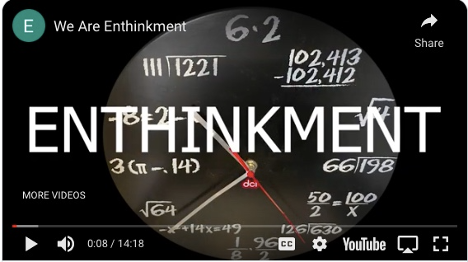
Click Here for our 1st YouTube
